Latter half of January 2022
“We do not learn from an experience …
We learn from reflecting on an experience.”-Adaptation from A John Dewey discourse
Once we were out of range of cultivated vacation spots easily accessible from Mexico City (which everyone here simply and confusingly call ‘Mexico’) we pedaled into the state of Puebla, a land between lands.
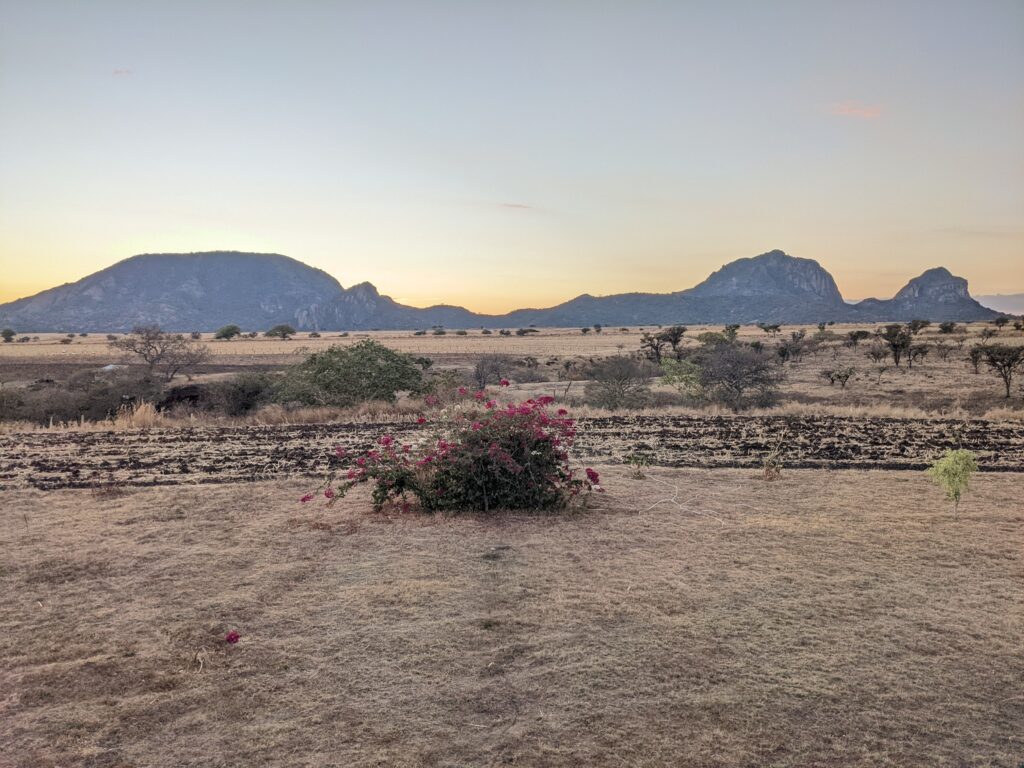
Open cowboy country, the landscape was dominated by open expanses of ranching, farming, and lots of sun. Crossing it, we heard every angle of the story of the Zapatistas, from those who lost vast family tracts, to those for whom la lucha is ongoing. As well as deepened the story of relationship with corn, the primary crop. I began to see how every stage of corn connected with their stories of life. How, even after we would perceive shucks to be dead and useless, they are dried, milled, and used again. Again, relating to a tradition more ancient than colonization, when bones were used for guidance and to settle disputes.
One encounter came on a long, hot day when sweat ran dripping down my nose and fogged my sunglasses. We were passing giant cactuses and kept wondering what they were. The next town, Pitaya, was named after the fruit given by the cactus, a bulky cousin to the dragon fruit, who have a very similar name. I felt silly as I realized how much like trees cactus are. We travel often through vast, leafless forests.
![]()
Most relevant to me on that hot day, was learning that from their fruit they made nieves: icy, sweet treats. We pulled over at one of the little shacks and the fellow dozing in the hammock jumped up and ran back to the house. A woman soon came running out.
Yesenia was brilliant and fascinating. As we enjoyed the treats and shade, she brought out and introduced us to several specimens of cactus her husband had brought in from el campo which she loved and tended. She introduced us to the patch of tiny baby pitayas who had grown from seeds where she had dumped a nieve, or pointing out where a bird had enjoyed and then deposited seeds into the dead limb of a tree, where one now grew.
She also spoke of times before her own. Of how the abuelos used to slice and eat the bisniega, who could grow to be over 150 years old. “Pero me parece que tal vez los ancianos tenian demaciado hambre, porque ya son protegidos, los bisniegas,” she giggled.
![]()
We talked about our friends, the bees, who were working on the last drops in my cup of nieve, their little abdomens pumping diligently, and she told us about some of the elders in town who use bee stings to heal. The intimacy with which she knew the land, the tenderness for her fellow residents, and the ease with which her narrative cycled through time, was inspiring.
Another passing encounter which left an impression arose when I stopped to take this picture of the happy cows and El Popo (as the locals call this volcano) and their keeper came over to chat a bit. I complimented his animals and pueblo, which is as good as complimenting him personally, and he asked the usual questions: where’d we come from, how long did it take, what about our families?
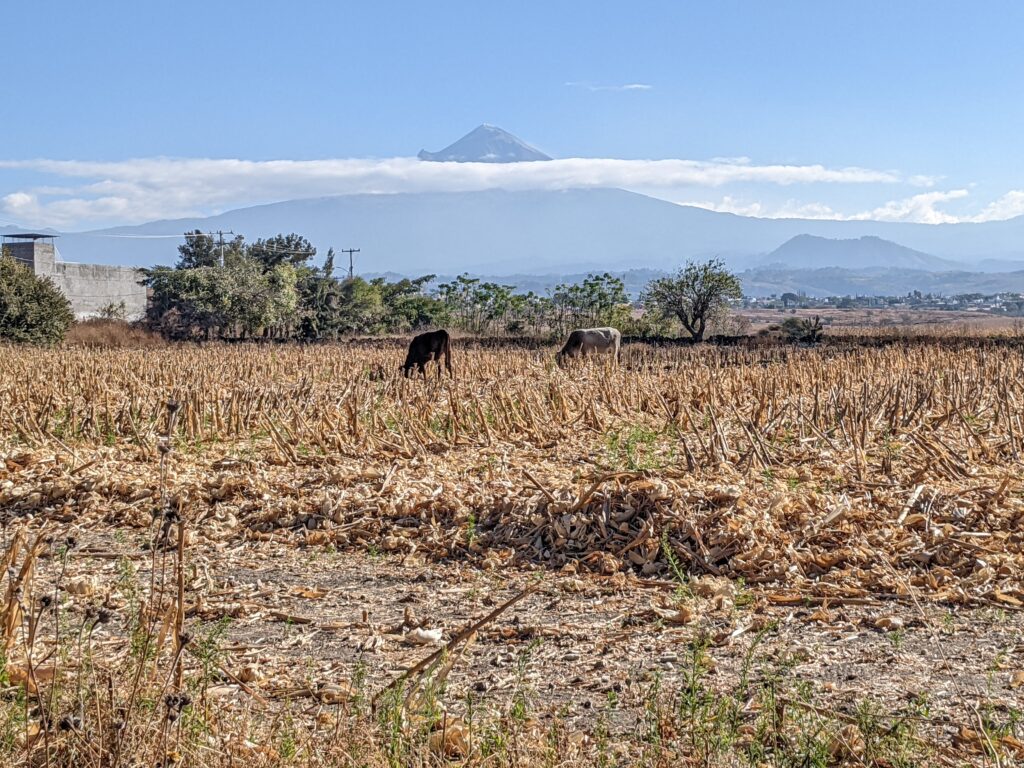
I told him we had come from the United States.
“Ah, Norteanmericanas,” he exclaimed in a friendly manner.
“Ud tambien eres Norteamericano!” I replied.
It is a pet peeve of mine, how people from the United States assume Mexicans are South American or, a mistake I’ve lulled into, thinking they are Central American.
Some subtle ember sparked behind his eyes and he gently but firmly replied, “pues, soy Americano…“
I’m still chewing on this one but suffice it to say, the relationship is complicado.
As a person who processes information through feeling, and my feelings being deeply informed by what is felt by those around me, it is pretty confusing to travel amidst such deep juxtapositions the depths of which I cannot hope to understand. This is probably why I prefer to move slowly and spend spells of time outdoors alone; It is how I synthesize information, through my fibers. Honestly, my healthy ratio is 4-5 days of wilderness to 1-2 days of human exposure and those are certainly not the balance in traversing these populated regions.
As such, and with Neon being deeply introverted, we have had to adapt and be intentional about cultivating rest time and space. When we find a comfortable, quiet place, we’d take a day. It’s one of the differences I have noticed between thru-hiking and bike-packing. Thru-hikers keep moving, many aiming for ‘near-0s’ (walk into town one morning and back out by the next afternoon). Bikepackers, on the other hand, will stop for multi-day sets and regularly (every 1-3 months on average it seems) stop for several weeks or even a month at a time.
![]()
Another difference between backpacking and bikepacking is that the backpacking routes and trails I know are open to contributions and adapt based on new information, input, engagement with people who live along the route, and natural factors. Bikepacking routes, on the other hand, appear to still be under some sort of machista singular point of authority structure. The first guy to ground-truth a line machinated by an app and drop a GPS line over it, it becomes his route and can only be updated when he decides. This is generally unhelpful in the quickly shifting social, digital, and environmental factors today.
We followed the Trans Mexico Bikepacking route for the last time when we sat at a dirt road junction in a desert valley bottoms. Our route would cross ways with it several times in the months ahead but we realized that for our safety we had to let go of ‘following.’ In this particular instance I’d been uneasy since I had seen a desiccated puppy dead on the side of the road a few kilometers back. Again, the treatment of animals is a key indicator I watch of social environs and this was a bad sign but things had been terse between Neon and I because of my dislike of certain components of bikepacking culture, which she was enjoying, so I was trying to let her take the lead and suppress my inklings.
She was inclined to keep following the route but as we sat deciding, a series of 3 different branches of military in armored vehicles flew past with their sirens blaring and the soldiers in the back standing with weapons at the ready. We had become accustomed to seeing these convoys on the roads but had never seen them moving so quickly and at the ready. Then and there, we changed course and climbed into the heat back out of the valley.
![]()
As women travelers, while we do carry pepper spray, our safety measures begin well before we reach appreciable margins of danger. In this way, our travel methods fall somewhere in between those of bikepackers and backpackers. Stopping to rest more often than when backpacking but for less time than bikepackers. Aiming for a tighter schedule (2-3 months) than most spend in Mexico and Central America. Indeed, I could have happily spent 3 months or more exploring Mexico alone! Similarly, we were covering significantly more ground in a day than when walking: ~60 km on dirt and 80-120 km on paved. The trade off was that we found ourselves needing rest more often, about once every 3 or 4 day, rather than walking when we could comfortably sustain 4-6 day spells of movement. We came up against this balance, as usual, in indirect ways.
On the 5th day of a stretch, what had looked like dirt country roads in the apps, led us deep into commercially farmed corn. Thus, the roads had been dug up by the machinery and re-routed each season. Around 2, as the heat of the day was peaking and we still hadn’t eaten, weary and frustrated, we started to squabble. I carried frustration that Neon, having indicated interest in learning to plan and create route, had taken responsibility for plotting our way through the region. Her methods had been to download the Trans-Mexico bike route, to pull Google Maps walking directions, and reviewed state department safety ratings and left it at that.
In my experience, while these are critical components of route planning, they are not sufficient to set one up for safety abroad and success, even less so when left to fallow for years (due to COVID). I was unhappy, and had been trying to suppress it but amidst the compounded stressors it all came tumbling out.
Having relieved myself of the compounding frustration by spewing it all over the both of us as thickly as the burrs in our clothing, I felt both better and worse. We tabled it, giving our bodies time to process as we focused on extracting ourselves from the predicament. An hour later, we had found our way back to a paved 2 lane road and passing a house with a pile of coconuts out front, I stopped to ask for coco frio. They had a freezer and presented me with a large, icy nut.
![]()
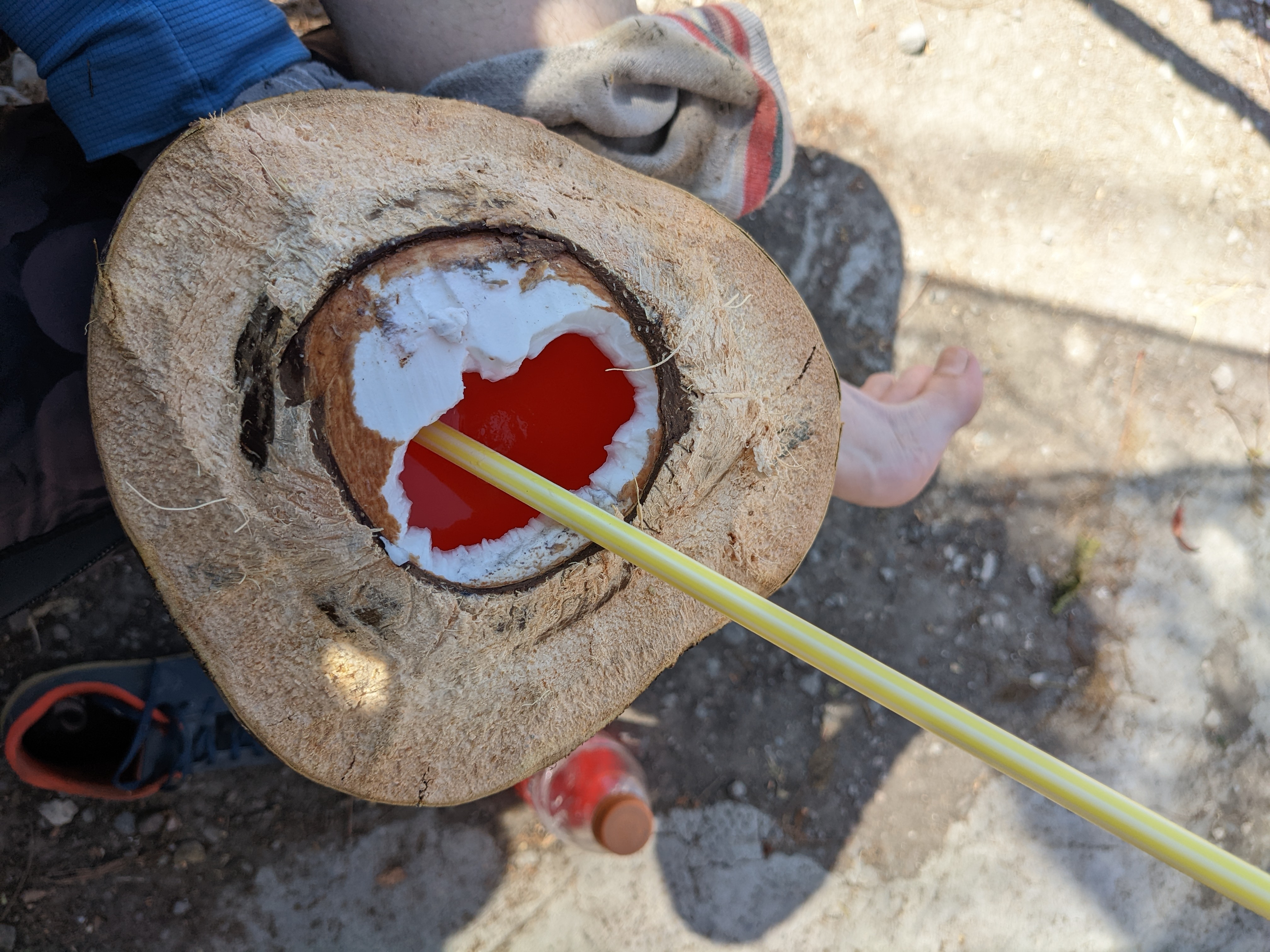
Sitting in the shade, slowly cooling down and intaking nutrients, we were able to reason and re-engage, coming back around to the matter and tackling the issue not as conflict between ourselves but as something to be reasoned through and better surmounted by working together. The partnership component on this odyssey requires a lot of work, patience, and trust. It’s easy to want to push it aside or put it off but intentionally making time on a daily basis has opened up space for growth which many people forgo. I have never worked this closely with someone, nor this deeply and under such trying circumstances.
We stopped by 4 pm, giving ourselves the afternoon to each take some time at a lovely hacienda, cooling off in the swimming pool, enjoying the company of the animals, and rejoining for dinner that evening to goof around and revel in the unique environs.
![]()
In the next pueblo, after carrying our bikes over the shoulder of Volcan Ocotecatl we took a rest day in Tlacayapan, to do town chores like laundry and writing. Efficiencies of tasks taken for granted in the first world are an exercise in social navigation. We joke that everything will take at least a half hour longer and 3 more people than you expect. A good example was finding stove fuel.
![]()
In some Latin American countries, pharmacies can only sell up to 70% alcohol because folks tend to drink it. Some drink it until they go blind. It is also our preferred stove fuel, since we happened upon it somewhere around Bolivia. Basically, it is hooch and it burns clean and hot. But, you have to know where and how to find it, as it is kept quietly in blue jugs under the counter of certain shops. And people never believe werotas like us would be looking for something like that.
So, we start at a pharmacy, asking for the alcohol we know doesn’t exist. We explain our plausible plight of seeking fuel, if they seem to understand. We all stand there and stare forlornly away from one another bemoaning the hopelessness of our situation and I specifically mumble of our dire need to no one in specific.
Then, an outlandish idea dawns upon me, I let the expression move across my face. A daring, last chance effort!!
I ask indirectly if maybe the pharmacist has heard of somewhere around town that we can get alcohol pura (it goes by different names in different regions and countries and you have to know which words to use).
Well, yeah, maybe she heard that one time the abarrotes down the road with the blue awnings might have it. But she doesn’t know and she has nothing to do with it.
Of course not! And of course, nothing can be said directly except conveyance of thanks. We move confidently as I relay what I’ve learned to Neon.
Much of the communication is non-verbal. I am learning when to allow eye contact, intentional facial expression, and body language, holding pauses, and subtle gestures. What is verbal, is indirect, otherwise I am being rude and they get skiddish. Neon says she is generally unaware of most of it but her stillness and eye contact serve as an asset in many circumstances. I begin to appreciate how growing up as a 3rd culture kid attuned me to things many might miss.
The folks who sell the hooch, make no pretense. I don’t know if you’ve ever met a bootlegger but they are pretty straight forward people. Once you’ve found the right person it’s easy and cheap. We begin our shopping by asking for tortas, then I ‘happen’ to notice the bottle on the shelf and ask for a half liter. She is practiced at not second guessing shoppers.
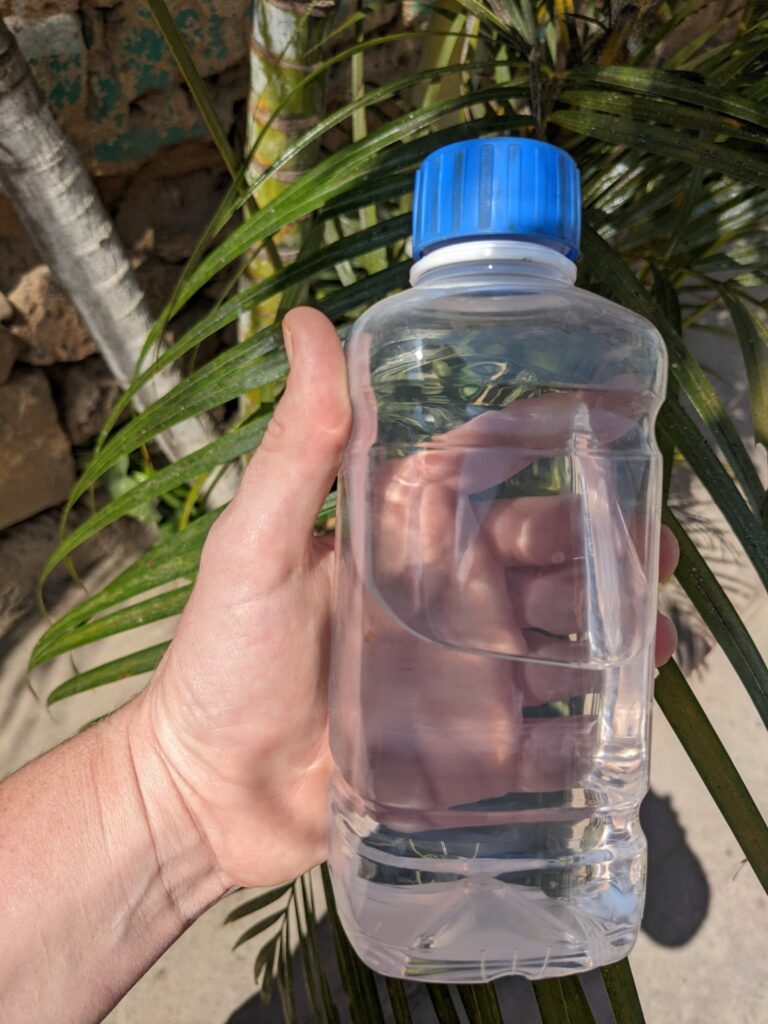
Still, exhausted from all the rigmarole, we then have to make time also for rest, to allow ourselves some easy things. Like eating at a tourist restaurant, where we continue exploring the different flavors and styles of mole. It seemed to change from one state to the next, much as the empanadas had throughout the southern cone.
![]()
I begin to appreciate this balance, of having been in both worlds but being from neither. That I can navigate Latin culture and feel cared for amidst it and then also feel drained and need to recover alone. Allowing myself to retreat and rest without feeling like I am abandoning the cause has been hard to arrive at. Yet, as I do it, in that space I find the ability to process and interpret. To electively enter into survival lifestyle and also allow myself to step out of it and have time to process.
It is from this space, also, I have approached a new way of giving.
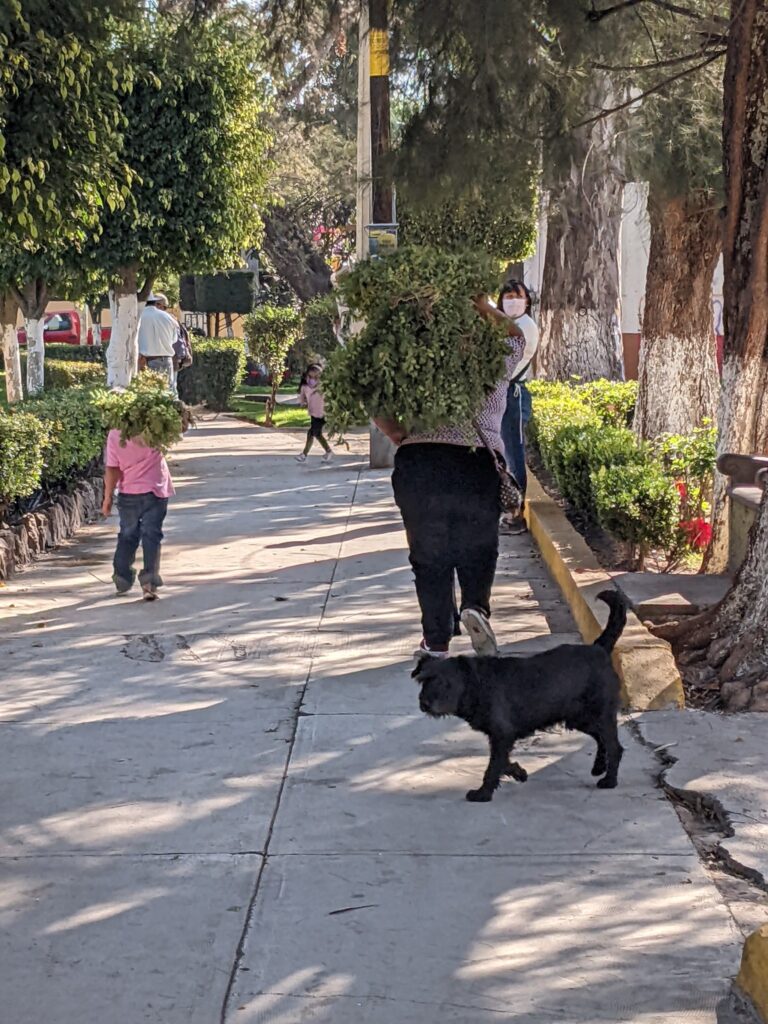
I was raised being taught not to give people money on the notion that if we gave, people would become dependent. The thing about traveling through is, there is not dependency. We literally won’t be there tomorrow and our moving through is an short and precious opportunity to forge connection. In many cases of the people we meet in the villages, some have not seen very many white people, except in movies. Thus, they tend to stare and children are sometimes frightened, because of unfamiliarity. Thus, every interaction was also an invitation to share and an opportunity.
In this case I snapped the above picture and hurried up to speak to this woman and her little on their way to market. I was curious about what kind of plant they had. I’ve seen a lot of folks shucking them and she told me they were garbanzo beans. I thanked her for the information and told her I took a picture of she and her child working and she shrugged. I knelt down to the kiddo and asked if she helped with the shucking as well. She looked to her mom for affirmation then answered that yes she did. I gave her some coins, “para unos dulces mientras que trabajas.”
Her eyes lit up and she broke into a wide grin, “GRACIAS,” she was so excited but still remembered her manners. I could see the pride on her mother’s face as her daughter bravely engaged.
Since we give 10% back to the communities we travel through anyway, we’ve simply reallocated funds from going exclusively to organizations to also go to people we meet. It is my way of saying, “I see you and your work and you are appreciated.”
Despite the prevalence of poverty many live in, their labor and crops are a source of abundance so readily consumed by the first world, and taken from them at a pittance. Some of the people I have spoken with, earn less than .50 per hour on 12 hour days of hard manual labor in the fields. So from another perspective, rather than seeing it as creating dependence, it is a unique chance to acknowledge and honor others.
Coming from that kind of need, it is also true that, if you are about to be stationary and dole out coins to kids or food to dogs, more and more will keep coming around and it will become unpleasant so if we are about to eat a meal or spend some time on a town square, I watch the community and give as we are leaving.
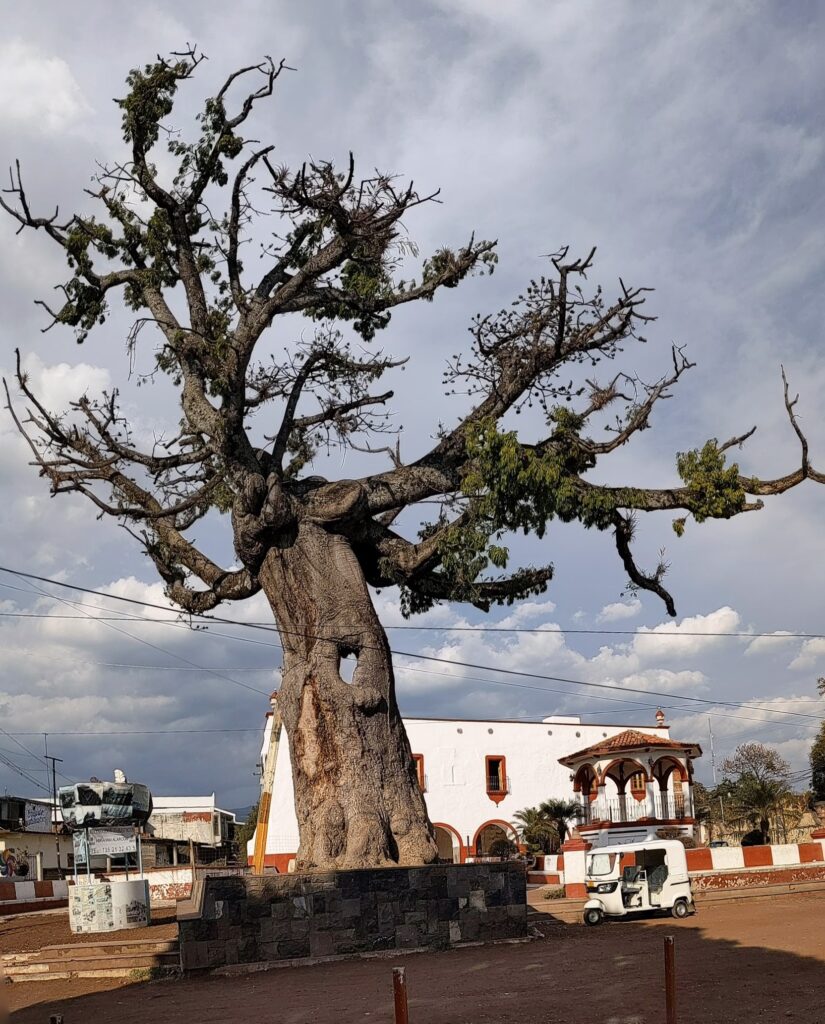
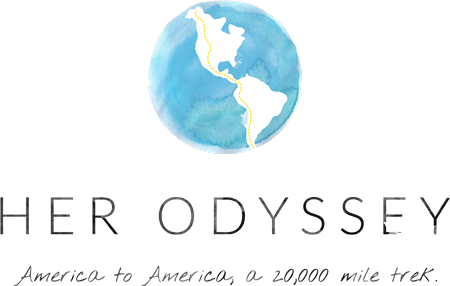

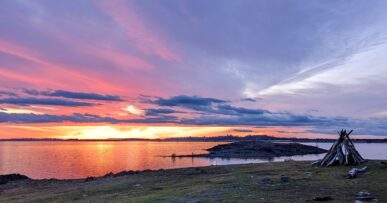
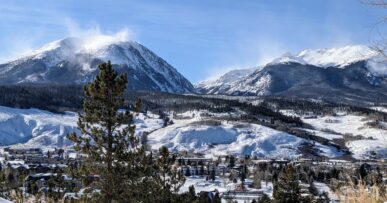
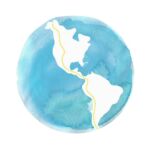

Comments (12)
Hola Fidgit and Neon. Me vas a tener que explicar que es bisniega!! Cuando vienes a Salida! Estoy de acuerdo contigo sobre el sexto sentido que se desarrolla cuando creces en un país del tercer mundo
¡Sí, tendremos mucho de qué hablar! Desafortunadamente, esta vuelta me queda muy poco tiempo, apresurando hacia Canadá y no podré llegar a Salida. Pero, eso quiere decir que después de que se complete la odisea, ud, Felicia, y nosotras todos podemos sentarnos tranquilitas para hablar, celebrar, comer 😉 y (que te parece) bailar, hasta las corazones, almas, y barigas llenas y contentas.
Your nice friend who would be appreciative for a translation of my comments and yours. I understand his predicament! Not everybody has the desire or curiosity to inquire and find out things.
I am the one who wrote in Spanish. I am 79 years old and I am learning Italian. I know It will not be as easy as it was learning English when I was a kid. But if he tries he will open a new world of amazing things.
Google translate is easy.
Always enjoy your posts. David Odell AT71 PCT72 CDT77
Hot diggity dog, David, those are some real thru dates. Was the term ‘Triple Crown’ even coined when you were undertaking those trails?! I am deeply honored that you read adn that you would take the time to comment.
I appreciate your candid comments regarding working through relationship decisions. Hard even in the best of circumstances. I love every post as you give us a balanced glimpse of the country, the peoples, the challenges and rewards.
Thank you for acknowledging this! I was, pretty nervous actually to share about it but I also see a lot of accounts gloss over it in writing or ignore that component in their personal engagement sometimes and, I don’t want to be that…
I enjoy reading all your posts. For those of us who don’t know Spanish, could you also provide the translation? I would really appreciate that.
Thank you for reading, I’m so glad you enjoy! I am also really excited you bring up the point about translations, as it is something I have thought about a lot and in fact, do not include it intentionally.
Let me explain why:
When I was a girl, reading literature by the likes of Jane Austen, they would include dialogue in French. It spurred my mind to curiosity. Sometimes I would work through it and figure out a few words, other times I would go to the dictionary, and other times I would just kind of, gloss over. Each of these engaged my brain differently. I want my readers to have the same invitation. I do a lot of work to translate experiences onto the page and leaving the phrases in Spanish is my way of asking you to meet me in a bit of that effort toward challenging oneself.
In these times, you have the option readily available to copy and paste the text into a translator and perhaps, by electing that small act of curiosity to learn, it helps engage and wake a brain up a little bit more. <3
I am afraid my 78 year old brain is not technically savvy enough to try getting the translation so I will continue to enjoy your posts MINUS the Spanish portions. I appreciate your explanation even though I don’t agree.
Well, ya know, I hadn’t considered it from that angle. Thank you for sharing!
I’ll meet ya in the middle and in the future, any longer quotes with content not explained by the context, I will include a translation to English and if there are specific ones that pique your curiosity and weary your brain that I forget to translate, drop a comment and I will reply!
In this post the conversations were:
“I told him we had come from the United States.
“[Ah, North Americans]” he exclaimed in a friendly manner.
“[You are also a North American]” I replied.
It is a pet peeve of mine, how people from the United States assume Mexicans are South American or, a mistake I’ve lulled into, thinking they are Central American.
Some subtle ember sparked behind his eyes and he gently but firmly replied, “[Well, I’m, American.”
I’m still chewing on this one but suffice it to say, the relationship is [complicated].”
At the end of the post, the conversation with the little girl and her mother:
“I gave her some coins, “[for some sweets while you work].”
Her eyes lit up and she broke into a wide grin, “[THANK YOU],” she was so excited but still remembered her manners. I could see the pride on her mother’s face as her daughter bravely engaged.”
That is so nice of you. I appreciate it